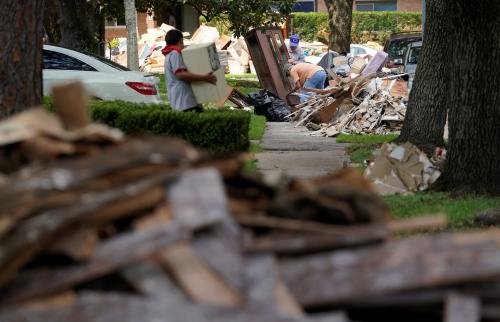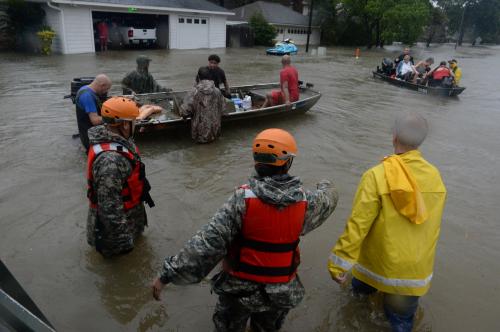This post is the second in a two part series about how procuring infrastructure systems, technologies, and services can be an entry point to resilience in cities, rather than an obstacle to it.
When governments purchase goods and services, they must often carry out a number of time-consuming steps to get anything done. This “procurement process” can be especially problematic when it comes to pursuing more resilient infrastructure projects at a local level. Indeed, procurement today is often reactive and driven by existing resources. Local leaders look to current budgets and plans to see what their agency can afford. In many cash-strapped smaller cities, the answer is: not much.
The creative solutions required to address complex infrastructure problems—including those caused by climate change—require a different approach. Ideally, the processes used to procure solutions to these problems should be proactive and enable cities to find new ideas, new partners, and new resources.
So how do we get there?
First, local leaders need to think about procurement differently, otherwise they will inevitably find it easier to replace failing infrastructure systems with the same old fixes rather than transitioning to more sustainable systems.
Unfortunately, our procurement systems were designed to meet a narrower set of needs than many government agencies have today. Most long-standing procurement systems—covering a wide range of goods and services, including infrastructure—were built to be defensive. They were designed to protect taxpayers from fraud and corruption, standardize processes to improve efficiency, and prevent discriminatory practices.
While these are still important objectives, focusing on only these defensive priorities makes it challenging to achieve other outcomes that we now expect from government agencies, such as having nimble technology systems and services. Instead, local leaders need to address their infrastructure challenges more deliberately, and that starts by considering new technologies, working with new types of partners, and exploring alternative implementation strategies.
Second, local leaders should look toward new types of procurement tools. For example, cities and counties like Atlanta, Boston, and Prince George’s County in Maryland have been experimenting with Requests for Ideas (RFIs), competitions and challenges, and performance contracts across a wide variety of sectors and applications to improve infrastructure and public services.
- Request for Ideas (RFI): An open call for ideas and/or information based on one or more challenges put forward by a city or utility.
- Competitions and challenges: An open call for solutions based on a bold problem with a specific incentive or prize for one or more winning entries.
- Performance contract: A form of agreement where payments are linked to achieving specific pre-stated measureable benchmarks or verified outcomes.
All three of these tools are more open-ended and outcome-oriented than conventional procurement tools (like Requests for Quotations and Requests for Proposals), which require the terms of a product or service to be clearly defined at the outset. The result is that each of these tools can produce a range of creative solutions—from the idea generating and data gathering phases of a project through to financing and implementation—and enable cities to tap into different ideas, partners, and resources than they would otherwise normally have at hand.
These tools can also be applied to help time- and budget-constrained local officials start now to address critical infrastructure challenges, including flood, drought, extreme heat, sea-level rise, storms, population changes, and more. However, not every tool is well suited for every situation. Each one requires different levels of local capacity and expertise. Local leaders need to better assess what models work well for them and develop a clearer path for action moving forward.
Just as it is possible to develop bad RFPs, it is also possible to have terrible RFIs, competitions and challenges, and performance contracts. Procurement success depends on framing problems well and setting effective procurement terms. Ultimately, local leaders need to set smart, early-stage procurement decisions and lay the foundations for better long-term climate, equity, and system resilience outcomes.
The Brookings Institution is committed to quality, independence, and impact.
We are supported by a diverse array of funders. In line with our values and policies, each Brookings publication represents the sole views of its author(s).







Commentary
Better procurement tools can improve urban resilience
December 3, 2018